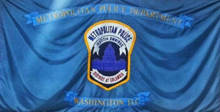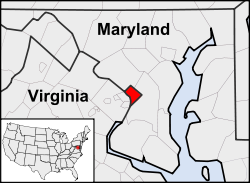Metropolitan Police Department of the District of Columbia
| Metropolitan Police Department of the District of Columbia | |
|---|---|
| Common name | Metropolitan Police Department |
| Abbreviation | MPD or MPDC |

Patch of the Metropolitan Police Department of D.C.
|
|

Seal of the Metropolitan Police Department of D.C.
|
|

Badge of the Metropolitan Police Department (badge number removed)
|
|

Flag of the Metropolitan Police Department of D.C.
|
|
| Motto |
Justitia Omnibus (English: "Justice For All") |
| Agency overview | |
| Formed | August 6, 1861 |
| Preceding agency |
Washington City police (daytime) Auxiliary Guard (nighttime) |
| Annual budget | $514 Million |
| Legal personality | Governmental: Government agency |
| Jurisdictional structure | |
 |
|
| Map of Metropolitan Police Department of the District of Columbia's jurisdiction. | |
| Legal jurisdiction | Washington, D.C. |
| General nature | |
| Operational structure | |
| Headquarters |
Henry J. Daly Building 300 Indiana Avenue NW |
| Sworn members | 3,797 |
| Unsworn Members | 435 |
| Agency executives |
|
| Divisions |
9
|
| Bureaus |
6
|
| Facilities | |
| Districts | |
| Police Boats | 2 |
| Helicopters | 2 |
| Horses | 4 |
| Dogs | 1 Bloodhound 31 German Shepherds |
| Website | |
| www |
|
Washington City police (daytime)
The Metropolitan Police Department (MPD), officially the Metropolitan Police Department of the District of Columbia, is the law enforcement agency for the city of Washington, D.C. With approximately 3,900 officers and 400 civilian staff, it is the sixth-largest municipal police department in the United States.The department serves an area of 68 square miles (177 km2) and a population of 672,228 people.
The Metropolitan Police Department is the primary law enforcement agency for Washington, D.C. It is responsible for providing police services to the District such as patrol and criminal investigations, and is also charged with protecting the President and Congress. As the capital of the United States, Washington is a Federal district and subject to the ultimate authority of the U.S. Congress, including the Metropolitan Police. The MPD has a unique role in that it serves as a local police department, with county, state and Federal responsibilities, and is under a municipal government but operates under Federal authority. They are responsible for operating the District's sex offender registry, approving all applications for motorcades, protests, demonstrations and other public events, and maintain the District's firearm registry. The MPD's mission states:
It is the mission of the Metropolitan Police Department to safeguard the District of Columbia and protect its residents and visitors by providing the highest quality of police service with integrity, compassion, and a commitment to innovation that integrates people, technology and progressive business systems.
The Metropolitan Police is the only law enforcement agency allowed under law to shut down roads within the District and is also responsible for the protection of the President of the United States. As such, the MPD always leads the presidential motorcade when traveling in the District and, under certain circumstances, also leads outside the District in conjunction with local agencies. They work closely with the U.S. Secret Service in planning presidential routes and providing protection for the President, the First Family, the Vice President of the United States, visiting dignitaries and VIPs as well as protecting foreign embassies.
Under the District of Columbia Home Rule Act, whenever the President of the United States determines that special conditions of an emergency nature exist which require the use of the Metropolitan Police force for Federal purposes, he may direct the Mayor to provide him, and the Mayor shall provide, such services of the Metropolitan Police force for up to 48 hours. During longer periods of time, the President must provide to Congress in writing his reasons for continuing control of the MPD. This control can be extended at any time beyond 30 days if either the emergency continues or if Congress passes a law ordering it.
...
Wikipedia
